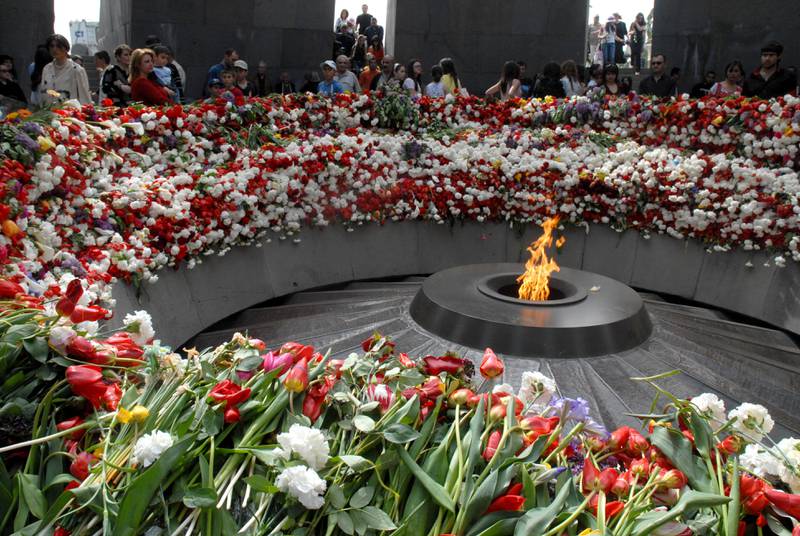Turkey has quietly sent Armenia a friend request

On the home front, Turkish President Recep Tayyip Erdogan is upping his rhetoric, threatening after last week’s Friday prayers to “rip out the tongues” of those who speak ill of the prophet Adam, referring to a five-year-old song by Turkish popstar Sezen Aksu.
Yet, beyond the country’s borders, the longtime Turkish leader is all about harmony. “If we are going to do politics, it can’t be done through confrontation,” Mr Erdogan said last week, citing emerging plans for the Israeli president to visit Turkey for the first time in 15 years. “We have to pursue politics along the path of peace.”
Turkish officials say Russia and Ukraine have expressed interest in Ankara’s offer to host peace talks, as some 120,000 Russian troops linger along the Ukrainian border awaiting instructions from Moscow.
The UAE finalised its $4.9 billion currency swap with Turkey last week and the two countries expect to sign further agreements when Mr Erdogan visits Abu Dhabi, potentially next month, suggesting Ankara’s years-long tensions with Gulf states have largely subsided.
But Turkey’s most meaningful rapprochement may be with Armenia. Despite sharing a 311-kilometre border, the two have never had formal relations. Divided by religion and conflicting origin stories, Ankara and Yerevan have long clashed over what happened in south-east Anatolia before, during and after the First World War.
The latter is convinced that 1.5 million Armenians were intentionally killed by Ottoman forces in a genocide, while the former admits many Armenians died but argues that all sides experienced a significant loss of life during the bloody years of conflict.
Many observers had thought the double whammy of Armenia losing the Nagorno-Karabakh war to Turkey-backed Azerbaijan in late 2020 and US President Joe Biden officially recognising the Armenian genocide six months later would drive them even further apart. But in recent weeks, almost out of the blue, the two have embarked on a normalisation drive, their third such attempt since the fall of the Soviet Union.
The first collapsed in April 1993 after Armenian forces occupied the Kelbajar region of Azerbaijan, prompting the first Karabakh conflict. Then in October 2009, the countries’ foreign ministers signed agreements establishing diplomatic ties. But the next year, Mr Erdogan decided against endorsing them due to pressure from Baku regarding the Karabakh deadlock.
The first rumblings of this latest effort came last month, when both sides appointed special envoys to oversee negotiations – though 64-year-old Serdar Kilic is a bit more experienced than 31-year-old Armenian envoy Ruben Rubinyan. In mid-January, they met for “positive and constructive” talks in Moscow, the first high-level diplomatic meeting between the rivals in more than a dozen years.
Turkey-Armenia flights, the first since 2019, are expected to resume next week. Another positive sign is that Azerbaijan has refrained from voicing any objections, with Baku signalling continued friendliness towards Ankara with an expected €1bn ($1.13bn) currency swap.
Azerbaijan’s late 2020 recapturing of occupied lands in Karabakh removed the primary Azerbaijani and Turkish objections to normalisation. Yet, Azerbaijani President Ilham Aliyev is widely thought to seek further concessions from Armenia. His likeliest objective is full control over the soon-to-be restored road and rail links through Armenia to Azerbaijan’s exclave of Nakhchivan – an issue on which Yerevan has waffled.
Turkey also backs the so-called Zangezur corridor, envisioning increased trade and broader influence in the Caucasus and Turkic-dominated Central Asia. Armenia may be willing to agree, as normalisation could grant it access to Black Sea, Caucasus and even EU markets. A European Parliament report asserts that re-opening its borders “would benefit greatly Armenia's economy and society...and open the way to the county's full integration into the region".
Russia, the US and the EU seem in rare alignment on Turkey-Armenia. They all support normalisation, believing it has the potential to strengthen the region’s energy infrastructure, boost economic growth and increase regional stability. The next round of talks is likely to be announced soon, but the road from here to normalisation is long and filled with potholes.
For one thing, the lack of diplomatic ties between Turkey and Armenia is not just a random European anomaly, but the result of a deeply rooted divide. The Armenian diaspora in particular strongly opposes Yerevan’s decision to exclude recognition of the genocide as a precondition. “An unrepentant genocidaire cannot be a trusted party with which one can negotiate in good faith,” Harut Sassounian, an Armenian-American commentator and former UN delegate, wrote this month.
With the lira holding steady, Mr Erdogan’s approval rating has ticked up of late, one of the few positive bumps he’s had since the pandemic began. But if talks drag on, he may risk alienating his nationalist parliamentary partner, the MHP, as elections approach in mid-2023.
Turkish nationalists tend to get exercised by any sign of kindness towards Kurds, Greeks or Armenians. Just last week, a prominent Turkish publisher cancelled the publication of a major book on Ottoman history because it mentioned the “Armenian genocide”.
Cosying up to Armenia right now could be problematic, which may explain why Mr Erdogan is latching onto conservative issues and lashing out at progressives like popstar Aksu. If he was aiming for a good old-fashioned culture war to distract the masses, Turkish social media suggests he has got his wish.
“Is it now down to ripping off artists’ tongues?” renowned Turkish actress Mujde Ar said in response to Mr Erdogan’s comment. “This is a clear and terrible threat, inciting the public against the artists. We don’t give up.”
